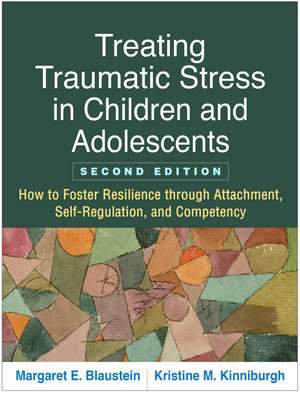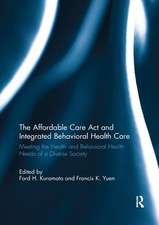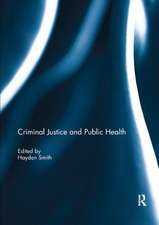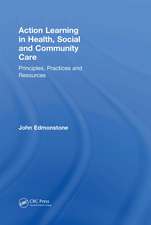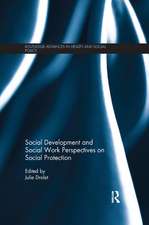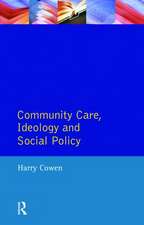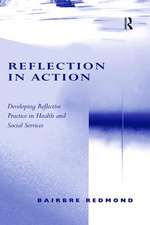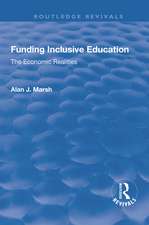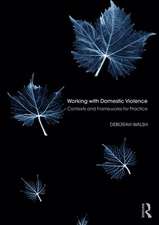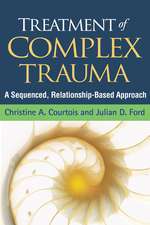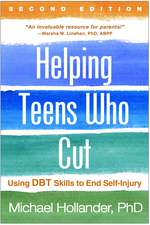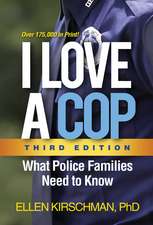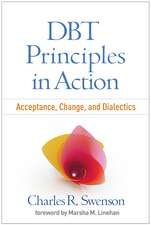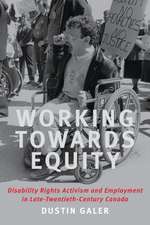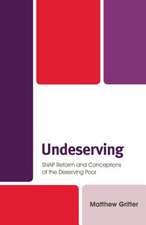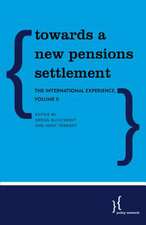Treating Traumatic Stress in Children and Adolescents, Second Edition: How to Foster Resilience through Attachment, Self-Regulation, and Competency
Autor Margaret E. Blaustein, Kristine M. Kinniburghen Limba Engleză Paperback – 11 dec 2018
Tens of thousands of clinicians have used this book--now revised and expanded with 50% new material--to plan and organize effective interventions for children and adolescents who have experienced complex trauma. The Attachment, Regulation, and Competency (ARC) framework can be used with children, parents, and other caregivers in a wide range of settings. The volume guides the clinician to identify key treatment goals and intervene flexibly to strengthen child–caregiver relationships and support healthy development and positive functioning. In a large-size formatfor easy photocopying, it is packed with case vignettes and clinical tools, including 79 reproducible handouts and forms. Purchasers get access to a webpage where they can download and print the reproducible materials.
New to This Edition
*Reflects the ongoing development of ARC, including important refinements to foundational strategies and treatment targets.
*More than 30 additional handouts and worksheets; all reproducible tools are now downloadable.
*Greater attention to caregiver skill development throughout.
*Addresses ways ARC is being used in nontraditional settings (schools, day care, primary care practices) as well as diverse clinical contexts.
See also Treating Adult Survivors of Childhood Emotional Abuse and Neglect, by Elizabeth K. Hopper, Frances K. Grossman, Joseph Spinazzola, and Marla Zucker, which presents a complementary approach for adults.
New to This Edition
*Reflects the ongoing development of ARC, including important refinements to foundational strategies and treatment targets.
*More than 30 additional handouts and worksheets; all reproducible tools are now downloadable.
*Greater attention to caregiver skill development throughout.
*Addresses ways ARC is being used in nontraditional settings (schools, day care, primary care practices) as well as diverse clinical contexts.
See also Treating Adult Survivors of Childhood Emotional Abuse and Neglect, by Elizabeth K. Hopper, Frances K. Grossman, Joseph Spinazzola, and Marla Zucker, which presents a complementary approach for adults.
Preț: 423.95 lei
Preț vechi: 446.26 lei
-5% Nou
Puncte Express: 636
Preț estimativ în valută:
81.13€ • 84.39$ • 66.98£
81.13€ • 84.39$ • 66.98£
Carte disponibilă
Livrare economică 24 martie-07 aprilie
Livrare express 07-13 martie pentru 54.73 lei
Preluare comenzi: 021 569.72.76
Specificații
ISBN-13: 9781462537044
ISBN-10: 1462537049
Pagini: 528
Dimensiuni: 203 x 267 x 30 mm
Greutate: 1.09 kg
Ediția:2 ed
Editura: Guilford Publications
Colecția Guilford Press
ISBN-10: 1462537049
Pagini: 528
Dimensiuni: 203 x 267 x 30 mm
Greutate: 1.09 kg
Ediția:2 ed
Editura: Guilford Publications
Colecția Guilford Press
Public țintă
Professional Practice & DevelopmentCuprins
Introduction
I. Overview
1. The Developmental Impact of Trauma
2. Child Development, the Human Danger Response, and Adaptation: A Three-Part Model for Understanding Behavior
3. The Attachment, Regulation, and Competency Treatment Framework
II. The Integration of Traumatic Experiences
4. Trauma Experience Integration
III. Laying the Foundation
5. Foundational Strategies: Engagement and Education
6. Foundational Strategies: Routines and Rhythms
IV. Attachment
7. Caregiver Management of Affect
8. Attunement
9. Effective Response
V. Regulation
10. Identification
11. Modulation
VI. Competency
12. Relational Connection
13. Strengthening Executive Functions
14. Self-Development and Identity
VII. Model Integration
15. Trauma Experience Integration Revisited
A Postscript
Appendix A. Provider Materials
Appendix B. Caregiver Educational Materials and Worksheets
Appendix C. Group Activities
Appendix D. Youth Educational Handouts and Worksheets
Appendix E. Milieu–Systems Materials
References
I. Overview
1. The Developmental Impact of Trauma
2. Child Development, the Human Danger Response, and Adaptation: A Three-Part Model for Understanding Behavior
3. The Attachment, Regulation, and Competency Treatment Framework
II. The Integration of Traumatic Experiences
4. Trauma Experience Integration
III. Laying the Foundation
5. Foundational Strategies: Engagement and Education
6. Foundational Strategies: Routines and Rhythms
IV. Attachment
7. Caregiver Management of Affect
8. Attunement
9. Effective Response
V. Regulation
10. Identification
11. Modulation
VI. Competency
12. Relational Connection
13. Strengthening Executive Functions
14. Self-Development and Identity
VII. Model Integration
15. Trauma Experience Integration Revisited
A Postscript
Appendix A. Provider Materials
Appendix B. Caregiver Educational Materials and Worksheets
Appendix C. Group Activities
Appendix D. Youth Educational Handouts and Worksheets
Appendix E. Milieu–Systems Materials
References
Notă biografică
Margaret E. Blaustein, PhD, a practicing clinical psychologist, is Director of the Center for Trauma Training in Needham, Massachusetts. Her career has focused on the understanding and treatment of complex childhood trauma and its sequelae. Since 2004, Dr. Blaustein has worked with Kristine M. Kinniburgh on the development, implementation, and refinement of the Attachment, Regulation, and Competency (ARC) intervention approach. She has provided extensive training and consultation to providers in the United States and internationally.
Kristine M. Kinniburgh, LCSW, is Director of Trauma Services for Justice Resource Institute Connecticut. In this role, she focuses primarily on ensuring that trauma-impacted individuals and their families receive quality care that emphasizes the promotion of resilient outcomes. Since 2004, Ms. Kinniburgh has worked with Margaret E. Blaustein on the development, implementation, and refinement of the Attachment, Regulation, and Competency (ARC) intervention approach. They are coauthors of the foster parent curriculum ARC Reflections and the caregiver skill building curriculum ARC Grow.
Kristine M. Kinniburgh, LCSW, is Director of Trauma Services for Justice Resource Institute Connecticut. In this role, she focuses primarily on ensuring that trauma-impacted individuals and their families receive quality care that emphasizes the promotion of resilient outcomes. Since 2004, Ms. Kinniburgh has worked with Margaret E. Blaustein on the development, implementation, and refinement of the Attachment, Regulation, and Competency (ARC) intervention approach. They are coauthors of the foster parent curriculum ARC Reflections and the caregiver skill building curriculum ARC Grow.
Recenzii
"This book is rooted in a lucid understanding of developmental and attachment processes and the impact that trauma has on them. Described in a way that reflects years of clinical experience, the interventions are sensitive to the complexities of clinical work with children, and provide guidance for working with caregivers, families, and systems of care. The book is encyclopedic--it is chock-full of information on everything from developmental theory to therapist self-care, matching interventions to patient needs, and implementation strategies."--Marylene Cloitre, PhD, Associate Director of Research, National Center for PTSD Dissemination and Training Division; Department of Psychiatry and Behavioral Sciences, Stanford University
"Confronted with the suffering of a child exposed to stress and adversity, it is easy for a clinician to become overwhelmed, unsure where to even begin addressing the complexly troubled and often chaotic lives of the child and his or her caregiving system. The ARC framework avoids doing what is all too common--simply affixing a diagnostic label to a traumatized child and providing a referral to a physician for medication. In clear, accessible, and direct language, using case illustrations, the authors present an integrative framework for addressing complex developmental trauma and the behaviors that signify it. ARC respects the art of therapeutic intervention while offering concrete goals, strategies, and interventions to guide the process of treatment toward health and well-being."--Sandra L. Bloom, MD, Dornsife School of Public Health, Drexel University
"The second edition of this extraordinary volume offers an even more integrated and comprehensive resource. The authors have fine-tuned the ARC framework, seamlessly linking theory and practice, individuals and systems, the needs and resources of children and their caregivers, behavior and triggers, and problems and solutions. They know what makes these kids tick--and how to help them. ARC is a practical, reassuring, step-wise approach that helps us to increase our own capacity for attachment, regulation, and competence as we do the same for dysregulated kids and their overwhelmed systems. If you have reached an impasse with a distressed child in the home, office, school, or treatment center, or if you need just the right handout, activity, worksheet, session tracking checklist, or educational resource to support traumatized children and caregivers, this essential book is for you."--Martha B. Straus, PhD, Department of Clinical Psychology, Antioch University New England
"The second edition of this excellent treatment guide provides cutting-edge information on working with children who have been exposed to complex developmental trauma and their caregivers. Adaptable for a variety of settings, ARC offers detailed strategies that increase the child’s integration of traumatic experiences and the caregiver’s capacities to nurture, parent, and provide optimal attachment experiences. Theoretical concepts are illustrated throughout by case examples, and are linked to extensive practical material on the core domains of attachment, regulation, and competency. This book represents an important contribution to the child trauma field and is highly recommended for new and experienced clinicians alike."--Cheryl Lanktree, PhD, Department of Psychiatry and Behavioral Sciences, Keck School of Medicine, University of Southern California
"An excellent resource for professionals in both clinical and educational settings. Blaustein and Kinniburgh effectively explain the complexity of developmental trauma, its impact on youth, and the need for individualized treatment, and present their ARC framework. The second edition elaborates on applications of ARC outside traditional clinical settings. It provides useful tools for professionals working with traumatized children, including downloadable activities and worksheets. Graduate students in school psychology, school counseling, pediatric neuropsychology, and clinical child psychology will benefit from reading this book in classes and using it as a resource in their future careers."--Terry Diamanduros, PhD, School Psychology Program, Georgia Southern University
-A comprehensive, practical guide....I would highly recommend [it] to anyone interested in the field. (on the first edition)--Journal of Mental Health, 6/1/2011"Confronted with the suffering of a child exposed to stress and adversity, it is easy for a clinician to become overwhelmed, unsure where to even begin addressing the complexly troubled and often chaotic lives of the child and his or her caregiving system. The ARC framework avoids doing what is all too common--simply affixing a diagnostic label to a traumatized child and providing a referral to a physician for medication. In clear, accessible, and direct language, using case illustrations, the authors present an integrative framework for addressing complex developmental trauma and the behaviors that signify it. ARC respects the art of therapeutic intervention while offering concrete goals, strategies, and interventions to guide the process of treatment toward health and well-being."--Sandra L. Bloom, MD, Dornsife School of Public Health, Drexel University
"The second edition of this extraordinary volume offers an even more integrated and comprehensive resource. The authors have fine-tuned the ARC framework, seamlessly linking theory and practice, individuals and systems, the needs and resources of children and their caregivers, behavior and triggers, and problems and solutions. They know what makes these kids tick--and how to help them. ARC is a practical, reassuring, step-wise approach that helps us to increase our own capacity for attachment, regulation, and competence as we do the same for dysregulated kids and their overwhelmed systems. If you have reached an impasse with a distressed child in the home, office, school, or treatment center, or if you need just the right handout, activity, worksheet, session tracking checklist, or educational resource to support traumatized children and caregivers, this essential book is for you."--Martha B. Straus, PhD, Department of Clinical Psychology, Antioch University New England
"The second edition of this excellent treatment guide provides cutting-edge information on working with children who have been exposed to complex developmental trauma and their caregivers. Adaptable for a variety of settings, ARC offers detailed strategies that increase the child’s integration of traumatic experiences and the caregiver’s capacities to nurture, parent, and provide optimal attachment experiences. Theoretical concepts are illustrated throughout by case examples, and are linked to extensive practical material on the core domains of attachment, regulation, and competency. This book represents an important contribution to the child trauma field and is highly recommended for new and experienced clinicians alike."--Cheryl Lanktree, PhD, Department of Psychiatry and Behavioral Sciences, Keck School of Medicine, University of Southern California
"An excellent resource for professionals in both clinical and educational settings. Blaustein and Kinniburgh effectively explain the complexity of developmental trauma, its impact on youth, and the need for individualized treatment, and present their ARC framework. The second edition elaborates on applications of ARC outside traditional clinical settings. It provides useful tools for professionals working with traumatized children, including downloadable activities and worksheets. Graduate students in school psychology, school counseling, pediatric neuropsychology, and clinical child psychology will benefit from reading this book in classes and using it as a resource in their future careers."--Terry Diamanduros, PhD, School Psychology Program, Georgia Southern University
Descriere
Tens of thousands of clinicians have used this book--now revised and expanded with 50% new material--to plan and organize effective interventions for children and adolescents who have experienced complex trauma.
